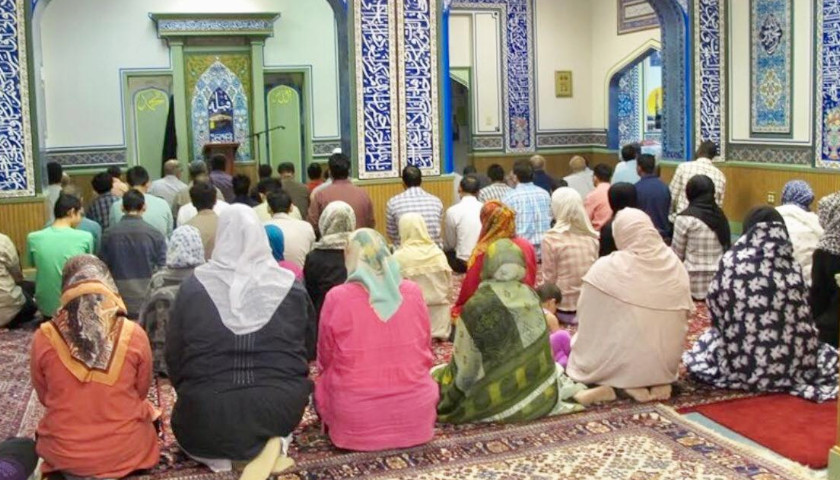by Ryan Mauro
The Manassas Mosque, a mosque in the Washington, DC area, explicitly declared its support for the Hamas terrorist organization in a recent newsletter. The mosque’s support for the Iranian regime has raised the concern of several congressmen.
The newsletter, which was first noticed by the Capital Research Center in collaboration with Focus on Western Islamism, states:
We stand firmly with the Palestinian Resistance (Hamas) and the courageous people of Palestine. With the help of Allah (swt), they will bring liberation and justice to Palestine and to the rest of the world. The Israeli regime is weak and afraid of all the calls for the freedom of Palestine taking place all over the globe. The regime’s days are numbered.
The Virginia mosque’s announcement is significant because it is so direct and brazen. While almost all other Islamist groups tiptoe around the question of whether they support or oppose Hamas, the Manassas Mosque’s stance is unequivocal.
Iranian Connections
The extremism of the Manassas Mosque caught the attention of members of Congress. In August, they wrote a letter to the Director of National Intelligence about four mosques—including Manassas Mosque—that are known to preach the ideology of the Iranian regime.
The letter states that the Manassas Mosque openly celebrated the anniversary of the Iranian Islamic Revolution, which brought the current theocratic regime to power, and that the inside of the mosque is “adorned” with pictures of Iranian Revolutionary Guards Corps members who were killed in action. It even has a life-size display of Ayatollah Khomeini, the founder of the Iranian regime.
The mosque’s website has a blog that honors Qasem Suleimani, the chief of the Iranian Revolutionary Guards Corps who was killed in a U.S. airstrike in 2020. The same blog also honors Abu Mahdi al-Muhandis, the leader of the Kataib Hezbollah militia in Iraq who was killed in the same airstrike.
The mosque’s imam, Abolfazl Bahram Nahidian, has a history of extremism. In 2010, he preached that the 9/11 attacks were perpetrated by a Zionist conspiracy to further a war on the Muslim world.
The Iranian government has had some disguised links to the mosque. The Alavi Foundation, identified by the Justice Department as a front for the regime, provided a total of $193,000 in 2004 and 2005.
The full extent of the mosque’s financial connections to Iran (or Hamas-linked entities for that matter) is unknown because, as a registered house of worship, it is not required to publicly disclose information or file much information with the government.
CAIR and Hamas
The newsletter shows that the mosque had Nihad Awad, executive director of the Council on American Islamic Relations (CAIR), come for Friday prayers. Awad publicly said he was a supporter of Hamas in 1994.
In a 2007 court filing in the case of convicted terrorist Sabri Bekhala, federal prosecutors stated:
From its founding by Muslim Brotherhood leaders, CAIR conspired with other affiliates of the Muslim Brotherhood to support terrorists . . . the conspirators agreed to use deception to conceal from the American public their connections to terrorists.
Although CAIR’s website says that Awad stopped supporting Hamas after it started suicide bombings in 1995 and that the organization has “consistently denounced violence by Hamas,” Awad was asked by Al-Jazeera in 2004 whether he supports Hamas. He said, “We do not and will not condemn any liberation movement inside Palestine or Lebanon,” obviously referring to Hamas and Hezbollah.
If CAIR is such an opponent of terrorism, why is its executive director speaking at a pro-Hamas, pro-Iranian regime mosque?
A Larger Problem
It may be tempting to comfort oneself by dismissing Manassas Mosque as a fringe group, but a new poll shows that its extremist ideology has mainstream acceptance in the Muslim American community.
The poll found that 31 percent of Muslim Americans have a favorable opinion of Iranian Supreme Leader Khamenei. Almost the same percentage—28 percent—said they strongly agree that Hamas’s terrorist attacks on Israel were justified. Another 29 percent somewhat agreed with the notion, amounting to a total of 57 percent that support the October 7 attacks.
The jaw-dropping statistics raise the question of how Hamas and the Iranian regime—some of the most vile mass murderers on earth—could possibly be so popular in the United States. As I recently wrote, the answer lies in the institutions of the Muslim American community. There is barely a trace of resistance to Hamas and the Iranian regime among the major organizations, mosques, and imams. On the other hand, there is plenty of open and indirect support for Hamas.
Manassas Mosque is a vivid example of a much larger problem.
– – –
Ryan Mauro is an investigative researcher for Capital Research Center. He is also an adjunct professor at Regent University and the former Director of Intelligence.
Photo “Muslims in Manassas Mosque” by Manassas Mosque.








